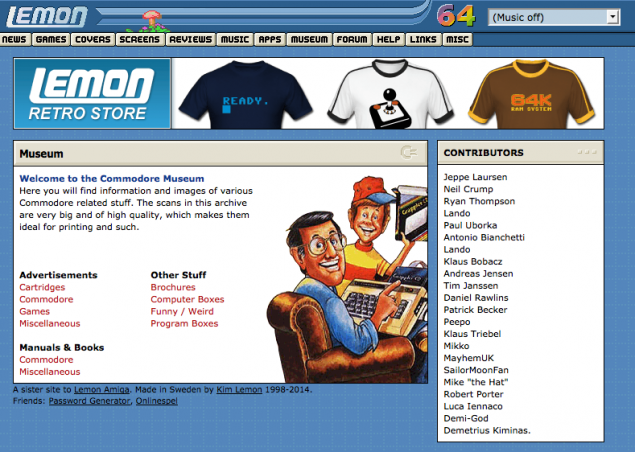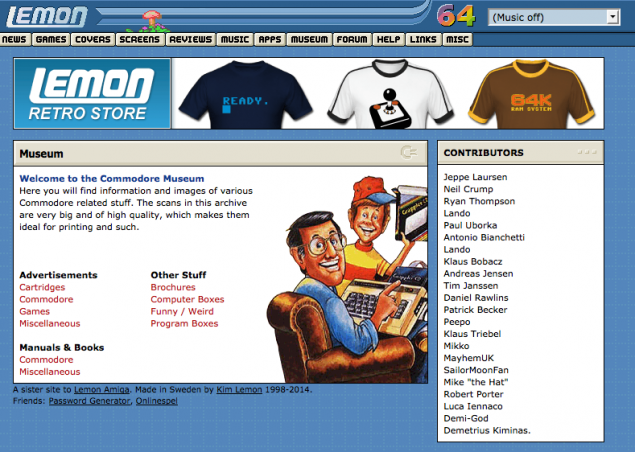
Over the next few weeks, our theme focus is on game fans and fan communities. Fans have had a significant role to play in taking the initiative to document and preserve videogames – the software, the hardware they were played on, and the memories and experiences of first playing them. Game fans have understood the cultural value of videogames long before universities and museums began addressing this issue. Operating outside institutional structures, fans have drawn on the combined knowledge of large communities to build a history of gaming that’s alive and dynamic and which continues to grow.
Consider the example of Retrogamer sites. The site GameBase64 was started by a group of C64 fan enthusiasts from around the world who wanted ‘to preserve the memory of their beloved 8-bit computer for the generations to come’. Their aim is to preserve game software written for the Commodore 64 computer before the deterioration of old disks and cassette tapes erases them for ever. GameBase64 have been collecting and archiving the games, as well as cataloguing information about their creators and programmers. With a list of over 24000 entries, they make clear their reliance on the fan community and its collective knowledge when they state ‘we are relying on you, the former Commodore 64 software user, to help us by supplying any bits of new info you might have knowledge of’.

Lemon64 follows a similar philosophy, one that’s informed our methods in the Play It Again project. With over 20 regular contributors who are Commodore64 fans to the core, they’ve relied on the fan community to fill in the gaps in what is becoming an encyclopedic collection. Lemon64 began as the project of fan Kim Lemon in 1998, and in 2002 Lemon began contacting software publishers and individuals for permission for the free distribution of their games on the site. It began about 16 years ago as a site that archived Commodore 64 games on a single website to meet the needs/interests of a single fan and by 2014 Lemon64 has become one of the most active C64 online communities that relies on thousands of individuals for its continuing presence and ever-expanding knowledge. Through collective input, Lemon64 includes information and images of games, hardware, game covers, original magazine reviews, manuals, music, links or downloads of the games if available, links to other sites, interviews with game developers, and many other goodies.
Many of the posts reflect on the importance of the site both in terms preserving past game technology and making it accessible to contemporary players, but also through the forum, helping preserve the memories of players who experienced these games and the hardware that drove them back in the day of their original release; in doing so they give life to the materiality of these experiences. One post from March 2002, for example, states: ‘You gave birth to this project and now it has its own life, reanimated every day by the people who get used to [sic] visit Lemon64 some times a day. And you can see, there are a lot of 8-bit fans out there — and Lemon64 is their worldwide melting pot.’ (- Sokratekk)
Motivated by nostalgia and by a personal past with the software and hardware, fan voices can often frame games in an intimate dialogue, and in Play It Again we want to hear these dialogues between players and the games they played. Fans have knowledge about the playing of games, the played games and the played with game; and fan discourse issues from a knowledge that is based on lived experience. Importantly, access to the past is made possible both by making games from the past replayable (which PMA aims to do with some games) and through a remaking that relies on the collection of fan and player memories.
In a recent interview with Mark Duffett, author of Understanding Fandom (2013), and draws attention to the fact that,
‘Fans use economic mechanisms for cultural purposes, while media industries use culture for economic ends. Both parties interact and are, to some extent, merged. They each, however, have distinct priorities. Fans are inspired by media products, but their concerns and practices cannot… be reduced to industrial planning…I think, though, that because our academic traditions work to ignore or reject a focus on the enjoyment of commercial culture, we are in danger of forgetting that win-win situations are part of this spectrum of relationships. Rather than searching for the dramatic moments where fans contest media producers, to understand fandom it seemed a greater challenge to me to start providing non-generalizing, non-reductionist frameworks within which we might explain why fans are sometimes complicit in doing what they do’. (Interview with Henry Jenkins on his blog, Confessions of an Aca-Fan).
The guest blogs over the next few weeks are, in many respects about the interaction between fans and industry but, more importantly, they reflect on the outcomes that are valuable to both as a result of fan ‘enjoyment of commercial culture’.
Do you have any stories to tell about your experiences with game communities? What is the importance of fans in game culture? Have game fan communities and practices altered over the years? We’d love to hear from you.
First up in our series of guest blogs for the ‘Fans and Fan Communities’ theme is Veronika Megler, coauthor of ‘The Hobbit’, a text adventure game (1982) developed by Beam Software and published by Melbourne House. In her blog, Veronika discusses her diverse, wonderful interactions with ‘The Hobbit’ fandom. More to follow…

My name is Mat, and I not only help moderate and keep things under control at both Gamebase and Lemon, but am part of the preservation projects to ensure old games do not fade into the aether. Fortunately things almost never get too rowdy that require blocking people out, but differences of opinion are impossible to avoid in this scene.
I’m both a games player and a collector. The collector part of me is what drives to preserve old games, transferring them from 30 year old media to digital form so anyone can play them in the future. If it wasn’t us, then no one would do it, and games would be lost. Sure, I don’t have a physical copy of the game in the end, but it’s the ability to play it that matters.
Hi Mat, great to hear from you. It amazes me how much effort fans invest in the continued presence of the games they love. You’re right, if you didn’t do it, then no one would and the games would be part of memory and, eventually, they would barely be any record of them. The games you convert to digital form, do you rely on gamers who have original versions to send them to you? Are they your own copies? How do you fit in a life in between all the effort and time you put into this?
I was a teenager in the 1980s and the C64 was my first computer. I have many great memories of playing games on it, learning the basics of programming, calling local BBS’s, etc.
I believe that games should be preserved not only for informational purposes, but so that others can enjoy them as well. I personally had a rare game called Star Battle, which I had bought directly from the author many years ago. I couldn’t find any mention of it on the net, so I made a copy of the disk and uploaded it. Unfortunately, I wasn’t able to make a working copy, but someone else was able to remove the protection and now the game can be played by all. If I hadn’t made the effort to copy the disk and upload it, this game would probably be lost.
Personally, I think it’s sad that many current games will be lost to future generations. Games on mobile devices can’t easily be backed up in many cases. Other games requiring online activation will probably fail in the future as companies drop support for older releases. Still other games are designed to only be played online and die when the company closes down the servers. Games like Aliens Online, City of Heroes, and Star Wars Galaxies will be unknown to future gamers.
Maybe I have a touch of OCD, but I don’t like the idea that the game I enjoy today may not be playable tomorrow. Game preservation projects ensure that that won’t happen
So true. Unlike films or comics, which you can rewatch or read, games come to life when we play them. Without the preservation of games we can only rely on our memories of having played them. Unfortunately, with the exception of really popular games, most game companies don’t rerelease their older games under the banner of retro. The result is that, unless fans take this on as a mission, hundreds/thousands of games are lost to history and new generations never get to enjoy them. Being an academic who teaches both film and games, it’s so much easier to give students an idea of earlier examples of film history because I and they have access to the films – even films that date back to the 1890s. Teaching game history is riddled with problems because often there’s limited access to game history – even dating back only a decade. If a game isn’t available, I have to rely on screenshots or snippets of gameplay players may have recorded and uploaded to youtube. This can never replace the experience of playing a game and getting to know its spaces, mastering our movements and exploration of those spaces etc.
It is ironic that those fans, fan communities and preservationists who are avoiding these titles falling into oblivion are breaching copyright. It is not so bad if you are in the field of academia since that can be said to be done for research and educational purposes. It was something I distinctly noticed recently while attending several high school open days – with countless student projects which if not for educational purposes would have breached copyright (whether that was music, print, video, etc).
Thank the preservationist, for they walk a thin line between loosing work forever and being prosecuted for doing it.